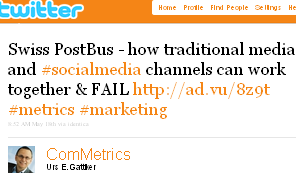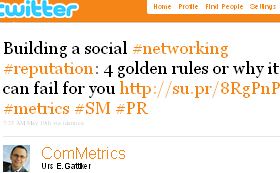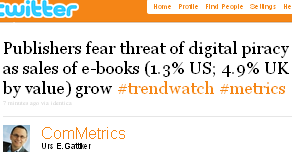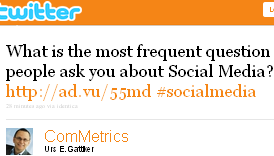We are back with another week’s worth of tidbits, tools and other happenings we came across while surfing the internet, blogging and posting on Facebook or Twitter.
In case you missed previous weeks’ memorable moments on social media, just point your browser to:
ComMetrics weekly review – social media going’s on
Don’t miss the upcoming week! Sign up right now with your email to get it first:
So here come the highs, lows and oddities I discovered through my various social media channels.
Sunday, Monday
 Online feedback is increasingly important. In fact, the web has essentially made everyone a product reviewer. Moreover, people have become suspicious of what companies say about themselves. In turn, peer reviews are seen as more objective.
Online feedback is increasingly important. In fact, the web has essentially made everyone a product reviewer. Moreover, people have become suspicious of what companies say about themselves. In turn, peer reviews are seen as more objective.
Now someone is studying whether Twitter chatter and subsequent ‘breadcrumbs’ touting a movie have an effect on its box revenues. Social media expert Deborah Drake brought a paper to my attention detailing these efforts.
- =>
The effect of Twitter chatter on box-office revenue
It is interesting to note that other micro-blogging sites, such as Naijapulse.com or Identi.ca, enjoy a closer relationship with box-office receipts than Twitter.
Correlation indicates whether two variables move together. Since, movie revenue tends to be higher when people tweet a lot about that movie, those two factors are positively correlated. But correlation cannot tell us why revenues are up: is it because people tweet (so their friends go to the movie as well), or do people tweet because revenue for a movie is high (i.e. a box office hit is written about a lot in the more traditional media). Maybe the two just happen to go together… as your doctor would say, more tests are needed to answer that question.
Tuesday
I went to Basel for a Xing Apéro, a forum for people from Germany, France and Switzerland to meet, chat and network. Recently, a friend told me she thought these things were useless, with mostly 40-plus folks attending and extremely time-consuming.
Of course it takes time to network. Moreover, selling is a big no-no at such events and the 30-second elevator pitch rule applies (i.e. explain in 30 seconds or less what you do so a non-expert can follow – see below, “what is social media”). But ask anybody and they have a few anecdotes about the power of schmooze. Personally, I am happy to chat with a friend or meet one interesting individual during these events, enriching my day.
Wednesday
 We held another successful webinar entitled ComMetrics University – Bill Gates, Greg Grunberg, Lukas Podolski, Ronaldinho and Kaka. This one was close to home because it addressed four rules to follow for successful networking in virtual groups, such as Xing or LinkedIn.
We held another successful webinar entitled ComMetrics University – Bill Gates, Greg Grunberg, Lukas Podolski, Ronaldinho and Kaka. This one was close to home because it addressed four rules to follow for successful networking in virtual groups, such as Xing or LinkedIn.
I myself have discovered that I don’t have the time to spend much time actively participating in the various groups I am a member of: the day only has 24 hours, no more. The webinar supplemented our blog post and discussions revealed that many more people seem to have issues managing this challenge.
- Article source:
ComMetrics University – Building one’s reputation on social networks
- Webinar abstract:
2010-05-19 ComMetrics University – Building one’s reputation on social networks
Next week, we’ll focus on issues regarding Twitter and how to make sure that your brand is being protected and supported with this social media activity:
Webinar descriptionComMetrics University – Twitter: Serving your clients better
Wednesday/Thursday
Olga and I had a chat during the Xing Apéro in Basel and then she left a question in our Xing Forum asking about what people tend to ask the most about social media. In my experience with business people, this question often pops up: What is social media?
So I tried to explain it addressing technical, software, social exchange and communication issues while still making it comprehensible. Here is my crack at defining social media:
- Social media encompasses Weblogs (blogs), social networks (e.g., Facebook), discussion forums (e.g., Xing groups), wikis, video and micro-blogs (such as Twitter), enabling users to create, record, discuss and share content with a few or many others.
A key point is that a consumer of content can also be an author of content. For instance, one can view videos online while also creating and sharing one’s own. What supports these developments is that software and other tools enable users to create their own private or proprietary social networks relatively easily, using only limited programming and/or technical skills.
This has led to a world in which software, tools or platforms supporting social media activities evolve increasingly quickly. What stays the same is people’s desire to communicate, interact and share content with other people.
P.S. – Social media is a great way to stimulate conversation and discussion between employees, customers, partners, and others.
P.P.S. – Social media users are nothing if not fickle and easily offended: many Facebook users were once MySpace users, while Google users were once AltaVista, MSN and Yahoo! aficionados. If a better version of Facebook is developed, there are surely people ready to switch allegiance and start using the new gadget. Customer loyalty in this business is very elusive.
Friday
Friday is usually a quiet day for me, but I got myself into hot water on our social media monitoring group by talking about sentiment analysis. A while back I had posted Sentiment analysis for online content: Honest? and recently came across another great blog post about text analysis:
Discussing text analytics and sentiment analysis’ merit in social media measurement
- (read it, it’s interesting!)
Saturday/Sunday
Next week, Facebook will serve up another privacy policy change. Facebook’s December changes made sharing information with everyone a default setting. Naturally, many users complained and considering that
- – Facebook’s Privacy Policy is
5,830 words long
- ; and,
- – the United States Constitution (not including amendments) is a
concise 4,543 words
- ,
it seems likely that many people will overlook important aspects of the new rules.
Alert – Facebook launches privacy overhaul next week
 Trendwatch: Gail Rebuck, chairman and CEO of the Random House Group (Bertelsmann) has stated that illegal copying is “culturally ingrained”. She cited The Lost Symbol, Dan Brown’s follow-up to The Da Vinci Code as an example, which had spawned more than 1,000 illegal websites by the end of its first week on the market.
Trendwatch: Gail Rebuck, chairman and CEO of the Random House Group (Bertelsmann) has stated that illegal copying is “culturally ingrained”. She cited The Lost Symbol, Dan Brown’s follow-up to The Da Vinci Code as an example, which had spawned more than 1,000 illegal websites by the end of its first week on the market.
The American Association of Publishers estimates eBook sales made up 1.3 percent of total book sales last year. For the UK, the Publishers Association estimates digital sales made up 4.9 percent of total receipts.
That wraps up this week’s social media diary. Please let me know how you feel about it – your opinions matter to me!
Article source: ComMetrics weekly review: Sentiment analysis in social media

Pingback: World Economic Forum
Pingback: Urs E. Gattiker
Pingback: JobShoots
Pingback: Urs E. Gattiker
Pingback: Jolt Social Media
Pingback: SocialMediaSentiment
Pingback: patrick galvin
Pingback: Pedro Montalvo Sr
Pingback: andrew washington
Pingback: Salon Profit Seminar
Pingback: Rhona Nampijja Bossa
Pingback: Be Your Own Brand
Pingback: Sarah Strand